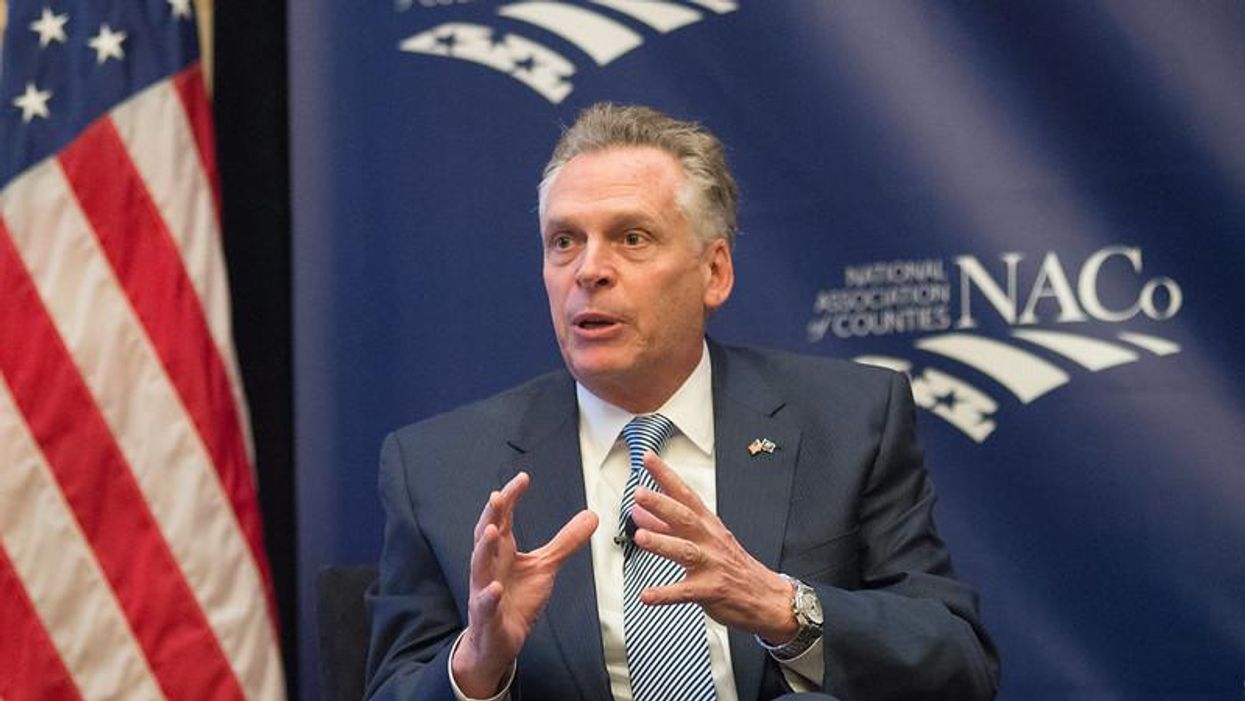Proof of the "panic" attack? "McAuliffe cut off one television interview last week," the outlet claimed. That seems like thin confirmation, considering candidates juggle media interviews all the time. Plus, the Democratic candidate did no such thing — he agreed to a 10-minute interview with a local Sinclair TV station and actually gave them 11 minutes.
Is McAuliffe's campaign in a state of "panic"? Axios provided no tangible evidence that it is. But the press seems to be rooting for a Democratic loss in Virginia, so the "panic" claim gets widely aired. Eager to portray Joe Biden's presidency as on the verge of collapse, the press is excitedly pushing the governor's race across the Potomac as a potentially cataclysmic event for the entire Democratic Party.
"Virginia's gubernatorial election is more important than ever as a national barometer" a CNN headline announced this month. What CNN and everyone else covering the race means is that if Democrats lose, the Virginia race will function as a national barometer. If Republicans lose, it won't mean a thing. Note there's a governor's race in New Jersey this year as well, and a Democrat is expected to win with ease. For some reason, that's not a "barometer" of anything.
What's happening in Virginia is the press is taking its beloved Dems in Disarray storyline out for a spin and ceaselessly stressing what a political disaster it would be if McAuliffe lost.
"It could trigger an all-out panic in the party" CNN warned. A Democratic loss would send "shockwaves that would rip through the White House." It would "swell doubts about Biden's own political authority."
Question: Do you remember this kind of breathless, what-if coverage in advance of the Georgia run-off elections in January, when Republicans faced the prospect of losing two U.S. Senate seats in a red state? I don't. In fact, much of the Beltway media simply assumed Republicans would prevail. Right after the November election, journalists covered Sen. Mitch McConnell (R-KY) as if he were the 2021 Senate Majority Leader, because of course Republicans would win in Georgia.
"How a Biden Presidency and McConnell-Led Senate Might Actually Get Along," read a Politico headline last November, even though we had no idea if there would be a McConnell-led Senate this year.
Today, CNN insists "a Democratic defeat in what has become a reliably blue state over the last decade would be impossible to ignore and would cause political headaches for Democrats that reach beyond the Biden presidency." But when Republicans lost not one but two races in a reliably red state in January, the press did not obsessively dissect the long-term implications for the GOP or Trump.
Note that we just saw this same type of premature, doomsday coverage with the California governor's recall vote. For months, the press insisted the polls were closer than they should be for a blue state, and then mapped out what all the catastrophic effects would be for the Democratic Party if Gavin Newsom were defeated. (Basically, it would mean the end of the Biden presidency, according to lots of pundits.) In the end though, the recall vote was an embarrassment for the GOP, which lost by 30 points.
Faced with that reality, the press quickly moved on to the Virginia contest, never acknowledging it had misread the California race for months. Even after Newsom's landslide win, CNN's Kasie Hunt went on Twitter and claimed the contest represented a loss for Democrats.
Caveat: I have no idea who's going to win in Virginia next Tuesday, and neither does a single reporter, editor, or producer covering the race. My point isn't about the eventual winner or loser. It's how the press is gleefully putting its thumb on the scale and producing hysterical, sky-is-falling coverage that would be more fitting for a Democratic trailing by 15 points, not one who is leading or tied in 23 of the last 24 polls, as McAuliffe is.
In Virginia, the press remains committed to presenting the campaign through a specific, Republican prism. Politico recently announced McAuliffe is "losing ground," when the polls have been remarkably consistent for months. In a recent page-one report from Virginia, the Times quoted five Republicans and just one Democrat. Days later, the Times published another front-page Virginia dispatch, claiming Democratic voters are apathetic about the race. Left out of the article was any mention of a CBS News poll at the time which found early voters favored McAuliffe by 24 points.
The Wall Street Journalalso tried to lean into the idea of apathy, stressing that early voting in the Commonwealth is down dramatically from the 2020 election, causing "heartburn" among Democrats. But 2020 was a presidential campaign when turn-out was high. The last time there was an off-year governor's race in Virginia was 2017, and early voting this year is up dramatically over 2017 — so much for the "apathy" narrative.
What's receiving a fraction of the coverage is the fact that the leader of the GOP basically isn't allowed within the borders of Virginia before Tuesday's vote because party strategists understand that a public appearance by Trump, and especially one of his incoherent rallies, would likely end the GOP's chances in a state with a large population of educated suburban voters.
It's an astonishing state of affairs — imagine if Democrats were terrified about Biden or Vice President Kamala Harris campaigning in Virginia. Yet Trump's toxicity is politely overlooked in the campaign coverage. Of course, if Republicans do pull off a Virginia win, the press will rush to credit Trump.
For Democrats, it's head you lose, tails you lose.












